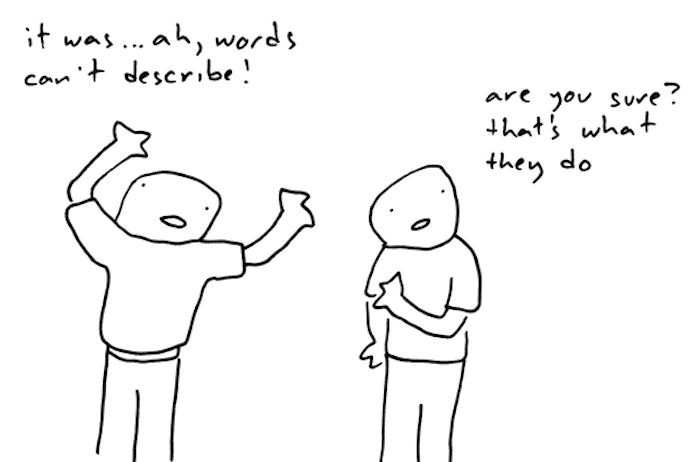It will be almost twenty-five years that I sat for the Advanced Placement Literature and Composition exam. And cheated. Now don’t go calling the College Board just yet to narc on me; the entire room cheated. And unsuccessfully to boot.
For those of you not familiar with this exam, it is the culminating activity of an actual Advanced Placement high school course, which in this case involved a prerequisite reading of about 15 classic novels, then one classic novel or play per week (oh yeah and hundreds and hundreds of poems) for the entire school year. One then discussed, analyzed, and wrote every day, while being timed. One was also graded each day, which in my case almost always produced depressing results. The pressure was extreme, especially for someone like me who was probably misplaced into Advanced Placement. Surviving this course and passing the exam defines you as smart enough to have completed college English 1101 and 1102, all before graduating high school.
I remember my exam day well. I had walked out of the Advanced Placement Español Language exam a bit deflated (¡puta madre!), but thought in contrast how bad could I score on an exam that was at least written in my native language?
I actually surprised myself. Up until I reached the final essay, I had been jamming. I had completed all the multiple choice questions at a near perfect pace, and practically wrote two of the three essays with my eyes closed. Then I reached the open response essay question. Certain death for the unprepared.
I vaguely remember the exact verbage, but will never forget the part of the question I could absolutely not answer. Using one of the listed titles (I chose Death of a Salesman) I had to describe, using specific examples from the text, how its use of stream of consciousness AND either ethos, pathos, or logos contributed to the characterization of the main, tragic character. I’m sure I just butchered the question- but what a mouthful, huh? Ethos? Pathos? Logos? Holy Willie Loman! WTF?!
I could read the collective thought on the faces of each and every student in the room. We had NOT ingested tens of thousands of words over the past nine months to allow just THREE to stand between us and AP success. For this reason, the SECOND the proctor left the room the student with the highest GPA in all of Broward County yelled out “Quick people, what the FUCK is pathos?!” All I could think was shit, he actually knew the other terms? We only needed to apply one, so if someone was brave enough to yell out a definition we were all home free.
“It’s SPIRIT. Pathos means SPIRIT,” said a voice two seats ahead of me. A desperate, well meaning classmate threw us the bone we needed. We were all smiles by the time our proctor returned, applying spirit until time was called.
The next day back in class we admitted to our teacher that few of us had a CLUE what the terms ethos, pathos, or logos meant. After being told that pathos did NOT AT ALL mean spirit, (SHITTTTTTTTT!) we discovered (thanks to our teacher who actually moonlighted for the College Board) that no other high school senior in the country did either. Did I (and thousands of other kids) pass the exam on a pity card? Maybe. Hey it beat the hell out of sitting through 1101 and 1102 freshman year.
End of back-story.
I felt a bit dirty having to “cheat” my way through the AP exam, but who can blame me, or any other teenager born in 1970 for not knowing the definition of PATHOS?
In fact, it’s taken two high school reunions to allow the term’s connotation to sink in. Pathos is derived from the Greek “suffering” or “experience” and refers to emotional connection. Empathy, or the ability to share the emotions of another, shares its root.
Empathy. Now that’s not a word one hears every day. Maybe it’s because we don’t all continue to hang with the AP crowd as we grow older. I have to admit though, I find few words in the English language as melodic.
I do not want anyone to feel sorry for me, or show sympathy that I have a son with autism. I have a great life, and as long as I don’t dwell on thoughts of missing out on becoming a proud mother of a Harvard grad, mother of the groom, or grandma, I continue to believe that. I am absolutely blessed to have a circle of friends who, in spite of their absolute ignorance of autism, have a gift for choosing just the right words. And it wasn’t until today that I came to this realization.
This morning I had a discussion with my friend’s husband about autism. Like a lot of people, he had questions. I had heard them all over the past few years. Do you think immunizations contributed to your son’s autism? How did you first learn your son had autism? …. Typical inquires for inquiring minds. This particular conversation was different though, and I was about as prepared for its impact as I was an AP exam retake at age 41.
He mostly wanted to know what my life was like living with a child like J.R. How did his condition affect the family? Would J.R get “better”? And what did I mean by “better” isn’t really a “cure”? He wanted to understand.
This man was in no way quizzing me as a means of reassuring himself that his own kids were “okay.” He was genuinely interested in learning what it was like to walk in my size 9’s. He had no idea (his words). The kicker? He admitted to feeling a little bit of guilt for not having to live my life. And he actually used the word: empathy. Kristi, I really empathize with your situation. No sympathy here. Just pure, unadulterated empathy. Wow. I’m pretty sure at that point my contribution to the discussion made about as much sense as my doomed AP essay, only because I had again become distracted by a single word.
And in that moment I realized, in spite of my “sins” of ’88, that this man had spoken so eloquently to the emotion so many of my friends had been expressing all along. It’s just that they had never used the WORD- empathy. As in, I don’t feel sadness for you. I just FEEL for you. I think I get why you think and act the way you do. And who wouldn’t in your shoes?
In an instant I felt like the luckiest girl on the planet. Why you say?
As an English major I naturally have a love for words (displayed in the wordiness of this blog…sorry). Sometimes though, we all come to realize the larger than life impact of one solitary word. For starters there’s that awful, terrible, no good autism. No need to define its horrific connotations. Why would we, as we also have the calm, quiet, gracious empathy?
I hope I always remember those moments when the true beauty of certain, well placed, single words become apparent. Today I had such a moment.
Frank if you are reading this, thanks bro.







Leave A Comment